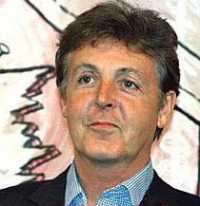Paul McCartney was born in Liverpool on June 18, 1942. He was raised in the city and educated at The Liverpool Institute, where he did better at English literature than at formal music lessons—developing a liking for the writings of Hardy, Wilde, Shaw, Dylan Thomas, Sheridan, Shakespeare, and Chaucer.
At the age of fourteen he wrote his first song, a reflective lament called "I Lost My Little Girl." Eight years later he returned to the same rueful theme when he found the words for probably his most-noted song, "Yesterday."
First with and then without John Lennon, McCartney wrote some of the best-known lyrics of the twentieth century, including "A Day in the Life," "Hey Jude," "Let It Be," "Eleanor Rigby," and "For No One." His last recorded words with the Beatles, "and in the end the love you take is equal to the love you make," epitomize his pride that the songs of the Beatles affirmed the positive spirit of the times.
In 1990, McCartney developed an interest in orchestral music that has found success around the globe through his compositions The Liverpool Oratorio, Standing Stone, and Working Classical. McCartney has further diversified his expression by exploring his passion for painting, creating more than 500 canvases, exhibiting in Europe and America, and publishing an extensive volume of his work.
He has been writing poetry seriously for the past decade. His poems are collected for the first time, along with his legendary lyrics, in Blackbird Singing, to be published in the United States by W.W. Norton & Company on April 23, 2001. A Freeman of the City of Liverpool and Lead Patron of The Liverpool Institute for Performing Arts, Paul McCartney is a Fellow of The Royal College of Music and a Fellow of The British Academy of Composers and Songwriters. In 1996, he was knighted by H.M. The Queen for services to music.
Despite his many artistic achievements, Paul McCartney says that his greatest accomplishments are his four children.
